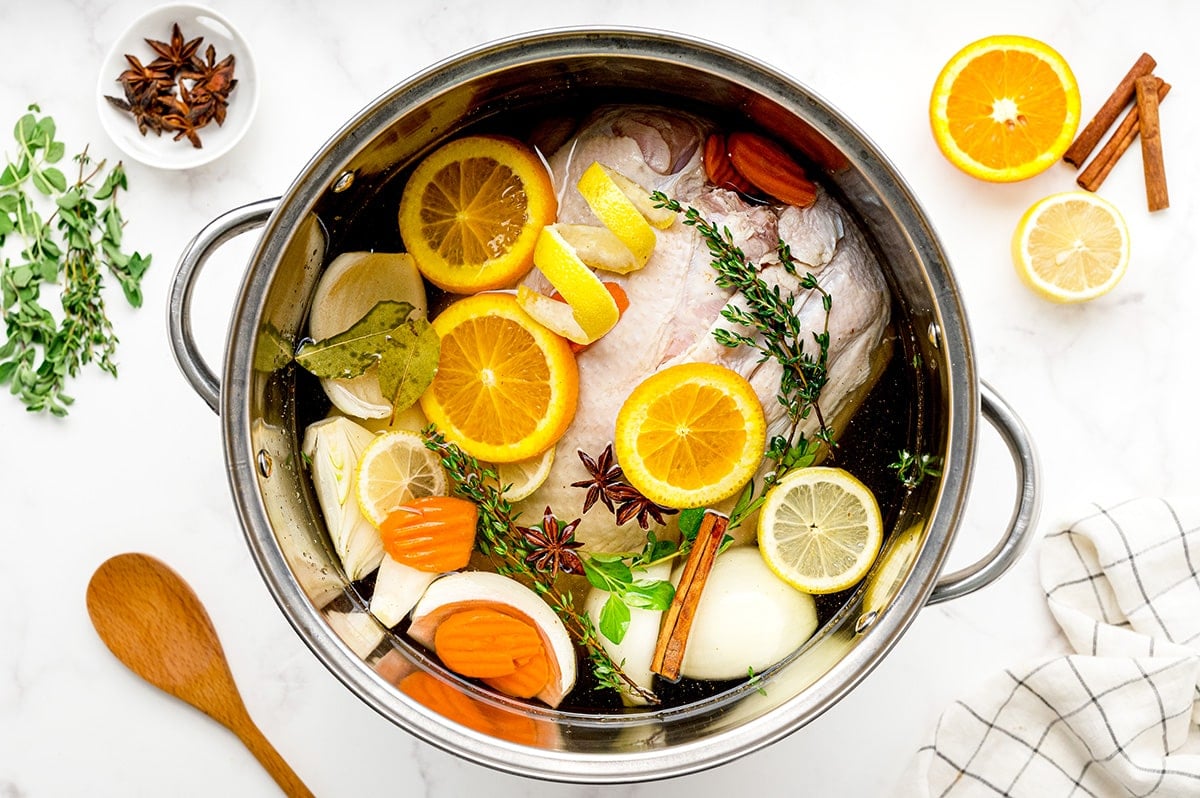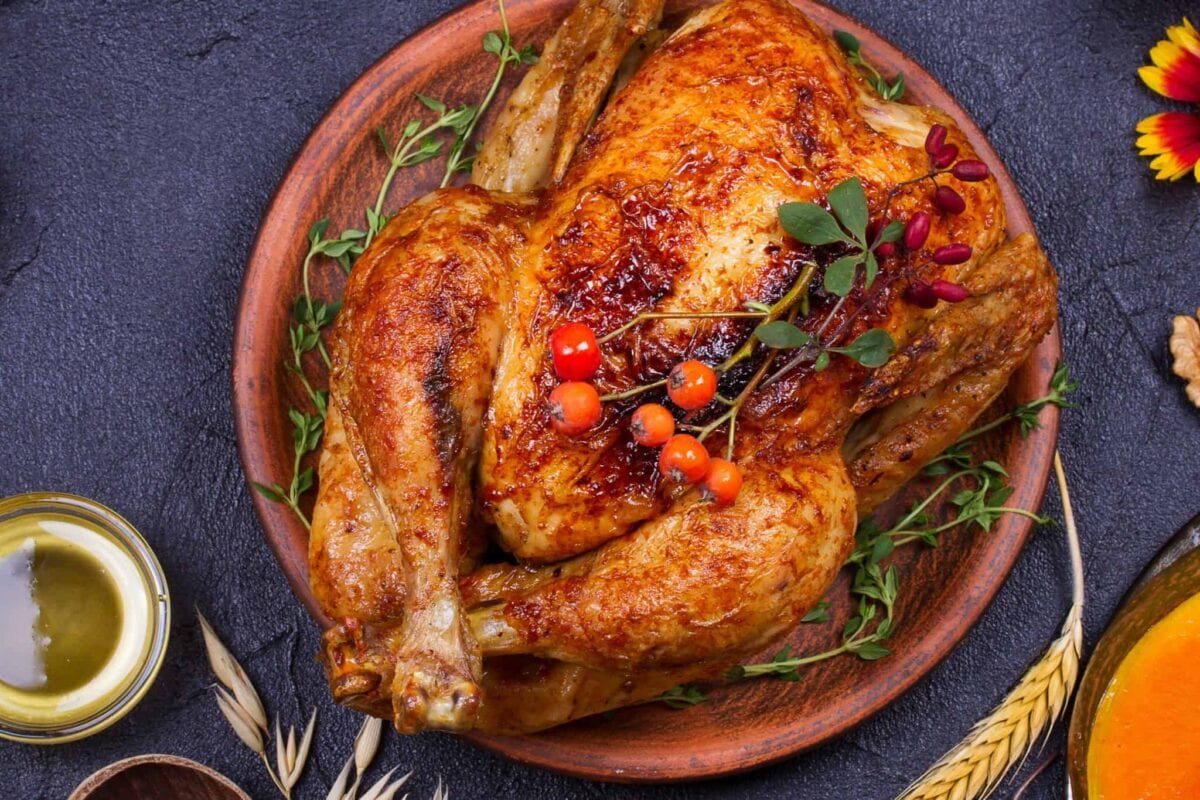Thanksgiving turkey recipes have sure come a long way. Thanksgiving dinner, in general, has come a long way!
Simple brine for turkey can be as easy as dissolving salt in water or as complicated as a two-day process of an herb infused brine and then allowing for an air dry for the perfect, crispy turkey skin.
Is it worth it to brine a turkey? I think so! Many others would agree with me. While there lots of ways to keep your turkey moist and succulent, brining is probably the best way. It adds flavor from the skin to the bone- no rub or injection offers that.
Brining a turkey before roasting it is a great way to help ensure a juicy and flavorful bird. The salt solution penetrates the meat, making it seasoned throughout and helping it retain moisture as it cooks. However, it is possible to overdo it. Brining for too long can result in turkey that is overly salty and mushy.
If you find yourself in a situation where the brining time has gone on longer than intended, don’t panic. With a few tweaks to your technique, you can still end up with a delicious holiday centerpiece.
How Brining Works
Before getting into the question of whether you can brine a turkey for too long, it helps to understand the science behind brining.
When meat is submerged in a saltwater solution, the salt causes the muscle proteins to unwind and the meat fibers to absorb some of the surrounding liquid. Over time, equilibrium is reached between the moisture in the turkey and the moisture in the brine.
Soaking in the brine solution accomplishes two things:
-
It seasons the meat, allowing the salt to penetrate deep into the tissue rather than just coating the outside.
-
It helps the turkey retain more moisture during roasting, so it turns out juicier.
An appropriate brining time allows these effects to occur without crossing the line into making the meat unpleasantly salty or spongy.
Signs of Over-Brining
How can you tell if a turkey has been brined for too long? Here are a few warning signs:
-
Very salty flavor – If you can clearly taste the salt throughout the meat, even after rinsing, it has become overly salty
-
Soft, spongy texture – The turkey meat seems wet and mushy, with an almost rubbery feel.
-
Dry, stringy white meat – While over-brining often makes the dark thigh and leg meat spongy, it can have the opposite effect on the breast meat, drying it out.
-
Bland flavor – If the turkey has been brined so long that the meat fibers have filled to capacity with liquid, its natural turkey flavor can become diluted.
Recommended Brining Times
To avoid over-brining, it’s best to stick within these general time limits when soaking a whole turkey:
-
6 to 12 hours for a small bird (8 to 12 lbs).
-
12 to 18 hours for a medium turkey (12 to 16 lbs).
-
18 to 24 hours for a large turkey (16 to 20+ lbs).
The exact timeframe can vary based on the size of the bird, the salt concentration in the brine, and your tastes. In general though, soaking for over 24 hours is venturing into risky territory.
I recommendstarting the brining the night before you plan to cook the turkey. This allows plenty of time for the salt to permeate deep into the thick breast and thigh meat, without keeping the bird in the brine so long that the texture deteriorates.
What to Do If You’ve Brined Too Long
Oops! You got distracted with holiday prep and left your turkey soaking for 36 hours or more. Is it doomed to be an overly salty mess? Not necessarily. Here are some steps you can take:
-
Rinse thoroughly under cold water. Run water over the inside and outside of the turkey to wash away excess surface salt.
-
Soak in plain water. After rinsing, soak the turkey in fresh cold water for an hour or two to help draw out some of the absorbed salt.
-
Dry thoroughly. Pat the turkey very dry inside and out with paper towels. Air drying in the fridge for up to a day helps too. Removing moisture on the surface will reduce the amount of salty drippings in the pan.
-
Watch the salt when making gravy. When making gravy from the pan drippings, go easy on any extra salt until you’ve tasted it. The drippings may have enough residual saltiness on their own.
-
Serve with sweet/tart sides. Cranberry sauce, sweet potatoes, sautéed tart apples, and other sides with sweet and acidic flavors can provide balance to salty meat.
Tips for Making the Best Brine
To get ideal results from brining, keep these tips in mind:
-
Use the right salt concentration. A good starting ratio is 1/2 to 1 cup kosher salt per gallon of water. The lower end of the range allows for longer soaking.
-
Add flavorings. Aromatics like peppercorns, garlic, herbs, citrus zest, and onions enhance the brine’s flavor impact. Sweeteners like sugar or honey offset the salt.
-
Chill thoroughly before adding the turkey. Make sure the brine is completely cooled before submerging the bird, to prevent bacteria growth.
-
Use ice to keep at a safe temperature. It’s important to keep the turkey at 40°F or below while brining. Periodically add ice to the cooler or bucket where it’s soaking.
-
Rinse after brining. Always rinse the turkey thoroughly under cold water when finished brining, to wash away excess salt from the surface. Pat it very dry.
Brining Too Long Isn’t a Dealbreaker
While it’s ideal to limit the brining time to less than 24 hours, all is not lost if you accidentally soak your turkey longer. With a good rinse, a soak in plain water, and some adjustments when making gravy, you can still end up with a tasty holiday bird.
The most foolproof approach is to brine for a moderate 12 to 18 hours. But if you do overdo it, removing some of the excess salt and seasoning the rest of the meal accordingly can compensate.
As long as you start out with good brine ratios and ingredients, remain vigilant about temperature, and take corrective action if needed, your prized turkey should still be delicious, even if brined too long. Just think of it as extra insurance that your hard work and preparation won’t go to waste.

How to make this Turkey Brine Recipe
- Prep the actual bird, removing all of the innards and any super loose skin that might be dangling off. Set aside until the brine is ready.
- Bring the water to a boil and then whisk in all of the seasonings and salt. Using hot water helps the salt dissolve and flavors to infuse the water. Allow to cool fully- putting the turkey in hot water will just cook it and we aren’t ready for that yet!


- When brine has reached room temperature carefully transfer the liquid and the turkey to wherever you plan to store it. Place in refrigerator for 24 hours. *
- Remove the turkey from the brine and rinse with cold water, this removed excess salt so it won’t be too salty. Pat dry and then prepare your turkey according to desired recipe.
How long do I brine turkey? The short answer is overnight up to 24 hours and this is dependant on how large your turkey is. A bigger bird needs more time to soak.
Can you brine a turkey too long? It is relatively hard to hurt the turkey, but yes, you can brine for too long. The result will be a tougher and salty bird. I recommend only 24 hours for a large turkey. For a super large bird you can push it a little longer. Brining a turkey for too long will make it too salty and the texture tough and spongy. You have to find the sweet spot.

What is the best salt to water ratio for brine?
The typical ratio for brine is 1/4 cup of coarse kosher salt to every 4 cups of water. However, this doesn’t have to be exact. I also strongly recommend using only coarse kosher salt, which is less salty and has less sodium If using table salt, the volume needs to be reduced by at least half and could still be a little too salty. Make sure to rinse the bird with cold water after brining.

Can you brine a turkey too long?
FAQ
What is the maximum time to brine a turkey?
What happens if you brine a turkey longer than 24 hours?
Is it okay to brine a turkey for 36 hours?
Is it worth brining a turkey for 12 hours?
How long should you brine a Turkey?
Depending on the size of the bird, the recommended brining time can be anywhere from 12 to 24 hours. If you want your turkey to have just the right combination of flavors and textures, it’s crucial that you brine it for the amount of time specified in recipes.
What happens if Turkey is brined too long?
Turkey that has been brined for too long might become too salty and soggy. Brined beef is more soft and juicy because the salt in the brine denatures the meat’s protein fibers. While tenderness is desirable, meat that has been brined for too long risks losing its distinctive texture.
Does brining a turkey make it tender?
A brine is a basic solution of water and salt, and it works all sorts of magic on your bird: During brining, the turkey absorbs extra moisture, which in turn helps it stay juicy. Since the turkey absorbs salt too, it also gets nicely seasoned. Even better, the salt breaks down some of the turkey’s proteins, making it more tender.
Can You brine a frozen turkey?
Fresh turkey works exceptionally well when you’re mastering brining a turkey, but a frozen bird will do as long as it is not self-basting or enhanced with a salt solution. Check the label or search the internet for details about your bird—it should be clear whether it’s already been basted or brined.
